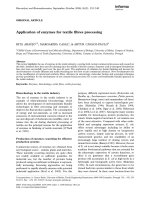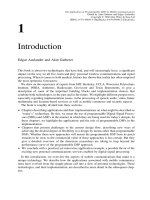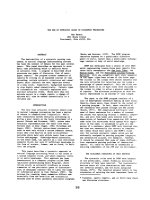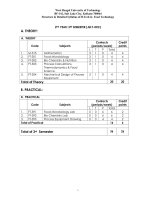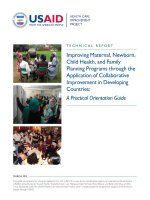Application of ISO 14001 in food processing enterprises
Bạn đang xem bản rút gọn của tài liệu. Xem và tải ngay bản đầy đủ của tài liệu tại đây (141.23 KB, 10 trang )
■2012 JSPS Asian CORE Program, Nagoya University and VNU University of Economics and Business
Application of ISO 14001 in food processing enterprises
Phan Chi Anh* - Dang Thi Huong*
Abstract: Environment is becoming hot issue to many countries and has attracted increasing attention of public
organizations, businesses and citizens in the world including Vietnam. One of the most importance choices for enterprises
to control and minimize negative impacts on the environment is application of environmental management system ISO
14001. In Vietnam, food processing enterprises have the highest number of ISO 14001 certificates compared with other
industry. However, the number of enterprises certificated ISO 14001 is still small and mainly belongs to the enterprises
with foreign direct investment (FDI). Therefore, the main purpose of this paper is to investigate current issue of applying
ISO 14001 and assessing the factors influencing the implementing of ISO 14001 in food processing enterprises. Some
suggestions for fostering application of ISO 14001 in Vietnamese food processing enterprises have been also made.
Keywords: Environment, ISO 14001, environmental management system, food processing enterprises, Vietnam
1. Introduction
Therefore, various non-government organizations and
In recent years, environment and food safety are
pressure groups have been encouraging businesses to
becoming hot issues to many countries in the world.
address the impact they are having on the environment.
Environment has been seriously destroyed; customers
Common reasons that encourage businesses to ―green‖
disbelieve and turn their backs on enterprises. These
directly
threaten
the
sustainable
socio-economic
development of each nation. Some countries including
their practices typically include growing consumer
pressure; the reduced costs associated with improved
Vietnam are paying a heavy price for economic boom
efficiency, the reassurance of regulatory compliance and
but
of
reduced insurance premiums (Peattie, 1995; Welford,
environment protection and food safety for customers.
1998). Some leading companies are using environmental
Therefore, solving the environmental pollution issues in
pressure to improve their operational efficiency, raise their
while
underestimating
the
importance
this current period of accelerating industrialization and
corporate image, develop new products and opportunities,
modernization is not only an imperative task for
governmental organizations but also the responsibility of
enterprises and the entire society.
Chan & Wong (2006) stated that business has an essential
and thus gain a competitive edge (Taylor, 1992).
To respond to these pressures, many organizations have
adopted environmental policies and carried out
environmental audits or reviews. One tool they could
role to play in preventing environmental damage, as it is
use to facilitate the implementation of environmental
responsible for much of the environmental degradation that
policies is a formal environmental management system
has occurred because of the process of production.
(EMS), described by Rothery (1993) as a means of
* University of Economic and Business, HaNoi National University
ensuring that an organization, in all of its operations
14001 standard foreseeing that their European-based
and activities, conforms to environmental targets set by
customers will require it. Globally, the trend of
its policy, which itself relates to standards set by
certified companies refusing to do business with
directives or other criteria. EMS has become enshrined
non-certified companies is increasing. Thus, exporters
in
EU
in developing countries will face more pressure from
eco-management and audit scheme (EMAS) and the
their trading partners in industrialized countries to
International
Standardization's
implement an environmental management system in
standard for environmental management systems ISO
compliance with ISO 14001. ISO 14001 EMS standard
14001. The main purpose of the EMS is to organize
may become a necessary condition of international
environmental work in such a way that an
trade. Besides that, several surveys and case studies
organization's environmental performance improves
have been conducted in Europe and in developing
continuously (Emilsson, Hjelm, 2002). It allows
countries released that generally, enterprises are often
organizations to be systematic in the evaluation of their
slow to respond to the challenge of improving their
processes and activities with regard to interaction with
environmental performance due to the lack of financial,
the environment.
knowledge and technical resources (Gerstenfeld,
ISO 14001 requires that adopting organizations create
Roberts, 2000; Hitchens, Clausen, Trainor, et al 2003;
an environmental policy, set objectives and targets,
Pimenova, Van der Vorst, 2004).
implement a program to achieve those objectives,
In Vietnam, processing industry in general and food
monitor and measure the program's effectiveness,
processing industry in particular are considered one of 7
international
standards
Organization
such
for
as
the
correct problems, and conduct reviews aimed at
major industries of the whole nation and given special
improving the EMS. As such, the EMS is a tool that
attention by the Government and Party. In recent years,
allows the continual improvement of the environmental
food processing industry with high growth rate has
behavior and performance (Emilsson, Hjelm, 2002;
Gbedemah, 2004; Johnstone, Scapecchi, Yiterhus, et al,
significantly contributed to the country’s GDP and
2004; Lozanoa, Valles, 2007).
attracted a large workforce. However, it cannot be denied
Since the introduction of the ISO14000 series in 1996,
that food-processing industry has caused many negative
companies seeking the certification have been
impacts on the environment, ecosystem, productivity and
increasing worldwide. The number of studies related to
public health, including air pollution, water pollution and
implementing ISO 14001 has increased as well.
solid wastes. The number of businesses violating the
Massoud, Fayad, Mutasem El-Fadel, et al (2010)
pointed out that main motivations, benefits, incentives
regulations on environmental protection is increasing. The
and challenges for acquiring ISO 14001 vary with
application of ISO 14000 in food processing enterprises is
location with no explicit prioritization. This may be
still limited with the number of businesses granted ISO
attributed to the several independent variables that
14000 certificates are still small. Meanwhile, studies related
influence decisions and priorities whereby the demands
to implementing ISO 14001 EMS in food processing
for acquiring the certification are fundamentally market
enterprises in Vietnam are still lacking, incomprehensive
driven particularly in industrialized countries (Boiral,
and scattered.
2007; Jiang, Bansal, 2003; King, Lenox, Terlaak, 2005;
Toffel, 2000). Many firms in Asia are adopting the ISO
2
Therefore, in this study, we attempt to:
+ Generalize current situation of applying ISO 14001
in food processing enterprises;
+ Assess the factors influencing the implementing of
ISO 14001 in food processing enterprises;
+ Give some recommendations for food processing
enterprises in order to foster the applying ISO 14001 in
Vietnamese food processing enterprises.
Source: www.vpc.org
2. Some facts and finger
Some previous studies found that food processing industry
It is suggested that implementing EMS can bring benefits
in Vietnam may have caused many negative impacts on
to a company not only in financial terms through a
the environment, including air pollution, water pollution
reduction in energy costs and other resources, but also in
and solid wastes. In term of air pollution, the most popular
terms of improving the company's image with the general
source of contamination is the stench of prolonged raw
public and other stakeholders (Hemenway & Hale, 1995).
materials, decomposed organic compounds in solid wastes
Therefore, numbers of companies seeking the certification
and wastewater water from sewers and drains…They
have been increasing worldwide. By December, 2009, ISO
create/release toxic gases (H2S, CH4, NH3…); mephitic
14001 was worldwide applied with 223,000 organizations
stench of raw materials in outdoor exposure conditions;
in 159 countries certified.
In Vietnam, the certificate of ISO 14001 was first
dust, gas and smoke generated by burning coal, wood; or
awarded in 1998 and since then the number of
temperature, noise arising from the boiler, from the stages
organizations certified has increased fast. By the end of
of food processing: mixing, cooking, baking, frying,
December 2009, the number of enterprises certified in
steaming… Using much water, food processing industry
Vietnam was about 500 enterprises. They are mainly
also releases large amount of wastewater. Wastewater
the enterprises with foreign direct investment (FDI),
consists of both living and production wastewater, derived
specializing in food processing, electronics, chemicals
from equipment coolers, cooking and steaming stages as
and construction materials. This is a significant
progress in Vietnamese enterprises’ awareness of
well as plant cleaning water. Generally, wastewater is
environment protection activities. However, this
organic- rich, easily biodegradable with high contents of
number is still small compared to other countries in the
COD, BOD5, SS, TS and sugar. Long time being in
region. In 2007, the number of ISO 14001 certificates
sewers, it creates stench and toxic gases. It also causes land
of Vietnam compared to Indonesia, Malaysia,
pollution and reduces underground water quality. Solid
Philippine, Singapore was only 50- 55% and to
wastes include wrappings, material containers, redundant
Thailand was 35% only.
materials, ashes, lime residues, deposited mud, living
Figure 1: Number of ISO 14001 certificates issued in
wastes from foods and drinks…These wastes will reduce
Vietnam by 2009
3
the quality of the air, land and water, negatively affect
human heath, even economy, environment and society
unless they are appropriately controlled and disposed.
3.
Discussion
Therefore, it is important to encourage food processing
The survey result showed that, only three ISO 14001 EMS
enterprises to apply ISO 14001.
certificates were reported within 15 food processing
enterprises in Ha Noi examined. They were all big veteran
According to experts, the sector of food processing
businesses having export market and strong financial
(sugarcane, seafood, alcohol, soft drinks ...) has the
power. The others were not much interested in ISO 14000.
highest number of ISO 14000 certificates. However,
They have been generally more concerned with safety and
most of them belong to FDI or export enterprises
quality issues rather than environmental issues. It is
which have large scale, strong financial capacity and
better capability of investing into the environment.
necessary for the companies in this industrial sector to be
Apart from the pressure from parent companies, these
aware of the importance of applying ISO 14001 and
enterprises understand that ISO 14001 can help them
minimizing environmental pollution.
reduce costs, promote the customers’ belief and
improve the image and competition ability in domestic
We also asked these enterprises about the barriers to
as well as international market. That is the reason why
applying ISO 14000. These factors include:
they invest more into ISO 14001.
ISO 14001 Awareness
The application of ISO 14000 in the domestic production
facilities and food processing enterprises is still limited. The
Recently, besides product quality improvement, food
number of businesses granted ISO 14000 certificates is
processing enterprises pay more serious attention to
small but the number of ones violating the regulations on
environmental issues because of their importance amid
waste water treatment, on environmental protection is
fierce competition, increasing demand from customers and
increasing. The authorities have discovered a mass of food
society. They understand that the observance of regulations
processing enterprises causing environmental pollution by
on environmental protection helps to bring about
discharging untreated wastewater outside, making
sustainable development, cost savings, better images in the
residents so distressed.
eyes of consumers and authorities. Good awareness of
The research scope of our study was some food
environmental protection creates advantages for a
processing enterprises in Ha Noi. To reach research
company to approach business opportunities such as
objectives, the questionnaire survey of food processing
capital, domestic and international bids. Therefore, 67% of
companies in Ha Noi was done. 50 questionnaires were
total food processing enterprises attending the survey
sent to senior and middle managers in these companies.
suppose that applying ISO 14001 ensures sustainable
These are the people who are normally highly involved
in planning and implementing the EMS in an enterprise.
business and good profits; 33% of them say that it
Finally, 15 responses were obtained, for a response rate
influences on immediate profits as well as sustainable
of nearly 30%.
business. However, with only 20% of them officially
4
applying ISO 14001, the awareness of this quality
low. Knowledge and skills of leaders and managers are
management system is still limited among the companies.
still limited. Many people majoring in engineering or
sociology hold positions of management or business.
Some leaders improve their qualifications through self-
Financial capability
Building and applying ISO 14001 need money for a
studying or short- term refresher courses. Failure to
great number of activities such as consulting, training,
ensure professional qualifications and management
wastewater treatment, solid waste treatment, improving
skills of enterprises’ leaders not only affect their
drainage
treatment
performance in present positions but also distract them
infrastructure, exhaust systems, management and
from accessing quality management systems such as
administrative costs, operation supporting costs… The
ISO14001.
costs vary among each type of enterprises, product
In addition, there is the shortage of staff having
features and operation scale, but financial resources
extensive knowledge of environmental protection in
must be prepared.
enterprises. According to the survey, only 20% of
Nowadays, the investments in environmental protection
enterprises
system,
and
wastewater
have
environmental
division
and
specialized workers, falling mainly into enterprises
mainly depend on companies’ own capital. With high
granted ISO 14001, the other 80% do not have such
average capitals, state-owned and FDI enterprises have
specialized staff. The shortage of environmental
more advantages to apply management systems such as
workers and the weakness of human resources have
ISO, HACCP... Small and medium-sized enterprises
limited the efficiency in environmental protection,
account for 97% of total enterprises in Vietnam. 50% of
covering the integration of new and environmentally
them have average capital of only 1-5 billion dong, which
friendly technologies, deployment of clean production
programs, and application of new management
is a barrier for applying ISO 14001.
methods in accordance with ISO 9000, ISO 14001,
7 out of 15 enterprises attending the survey (47%) say that
environmental certificates and brands
they are willing to pay for applying ISO 14000, but the
Technological capability
remaining 53% are not because of priority given to
In recent years, the food processing sector has made
production and business activities. Most of them say that,
remarkable progress in technology. Most companies
weak finance is one of the major barriers for them to apply
tend to develop and improve technology and
ISO 14001 and they need the support from environmental
equipment, use advanced technological line for
protection funds. According to the survey, nearly 100% of
production. This helps improve productivity, quality,
and reduce the impacts of waste on the environment.
the enterprises say that they did not receive any financial
In the process of technological innovation, the most
support (or so little) from the national environmental
significant measure adopted is to improve existing
protection fund and other ones, making it hard to apply
production processes. To state- owned enterprises, it is
environmental management systems.
less costly and easier than buying new technologies.
Human resources
Meanwhile innovation of the advanced technologies
The quality of the human resources in Vietnam
helps enterprises with FDI create good products.
enterprises in general (managers and workers) is still
Food processing enterprises have been actively
5
involved in researching, transferring and using
Enhancing awareness of leaders and staff
environmentally friendly technologies. These are some
on ISO 14001
major projects they have attended recently: Project of
Full understanding of quality management in general and
wastewater treatment technology for beer industry
(Institute of Beer- Alcohol- Beverage and consulting
ISO 14001 in particular is a very first step to build quality
office of Australia); Project of wastewater treatment
management programs. All members in a company, from
technology for confectionery industry transferred to
senior managers to ordinary workers must do that.
Tràng An confectionery (Technology Transfer Center
Although most of food processing enterprises in Ha Noi
from National Steering Committee on Water Supply &
have different measures to protect environment, the
Environmental Sanitation and Japan’s Technology
application of ISO 14001 is important and necessary. ISO
Transfer Office); Wastewater treatment system using
14001 not only helps control environmental issues, but also
Belgian technology for Bien Hoa II industrial park;
Italian technologies for Hazardous Waste Treatment…
reduce costs, improve the image and competitiveness for
However, the development and application of
the businesses. The companies should continue to promote
environmental technologies as well as importing
some activities such as educating, improving awareness of
foreign technologies in Vietnam are still spontaneous.
both leaders and staff on social responsibilities,
There is an absence of orientation and comprehensive
environmental management systems through some
management of the government, which leads to poor
following measures: Attending some training courses of
performance of technical equipment, wastage and
quality management, ISO 14001; Taking part in some
costliness.
technologies
forums, clubs on quality and ISO 14001, learning the
should be based on the criteria of modernity, efficiency,
methods of applying ISO 14001 from other organizations;
relevance and popularity. In addition, they must be
Enhancing awareness of all staff on social responsibilities
easy to manage, warrant, maintain with low costs...
through some training courses of environment, cultural
Choosing
environmentally
friendly
Importing technologies is an indispensable requirement
events or emulation movements; Improving the
amid weak market of environmental technologies,
limited resources of both human and finance…
corporation management skills of leaders and enhancing
However, besides the limitation of the importing
their awareness on green growth, social responsibilities and
investment and the limitation of management and
economic benefits as well from investing into environment
operation skills, the thinking of innovation in processes,
protection.
production methods and technologies is still sluggish.
That is the reason why the number of environmentally
Building environmental policies and the
friendly technologies imported is still small while
commitment of everyone in the organization
backward ones are excessively imported by the
In order to build a successful ISO 14000, the
companies. Therefore, environment pollution tends to
enterprises need to have a commitment and an
be more serious.
environmental policy agreed by leaders and all staff.
4. Recommendation
Environmental policy defined by top leaders represents
the orientation on environment of the whole enterprise.
6
The environmental policy must be built on the basis of
environmental policies for the company, and assessing
guidelines, general policies, orientation of sustainable
impacts on the environment.
development, and environmental protection strategies,
+ The staff must be able to operate the sewage
environmental law and related legal documents.
treatment system, analyze and check the safety of
Then, environmental objectives will be defined and
goods, environmental standards, regularly update
specified in each unit based on the environmental
market information related to environment.
policies. Environmental objectives should be specific,
Applying
quantifiable and evaluable. When building and revising
technologies
the objectives, organizations must consider the legal
requirements
and
many
other
ones
such
environmentally
friendly
Innovating production technologies is one of the most
as
important solutions to minimize environment pollution
environment, technological plans, business, finance,
and
and stakeholders’ views.
improve
competitiveness.
Technological
innovation helps companies reduce production costs,
Deploying ISO 14001 would not be successful without
improve products’ quality and meet the demand on
comprehensive commitment of senior leaders. The
standards for packaging, safety, processing, and
leaders must have a strategic vision, clear and specific
material savings. Nowadays, some food processing
values as well as customer-oriented goals. Besides
enterprises start to invest into technologies while many
building strategies, systems and measures, they must
of others do not have enough conditions. Their biggest
mobilize the participation and creativity of all staff to build
barrier is poor knowledge, poor finance, and poor
and improve environmental protection capability of the
information
organization. With the direct participation, leadership’ role
for
applying
the
system.
Therefore, they need to have strategies and appropriate
is to strengthen and to encourage value creation.
measures to innovate technologies. These are some
Training
suggestions:
In order to apply an environmental management
+ Innovating sewage treatment equipment to improve
system for producing goods with national and
operation efficiency and minimize environmental
international standards, the companies must plan to
pollutants.
train their staff. Studying the environmental standards
+
and regulations and applying them must be regular
Replacing
hazardous
technologies
by
environmentally friendly ones.
activities in the companies. According to the survey,
+ Adding some environmental pollution control
there is a shortage of staff having environmental
devices to existing equipment in order to minimize,
specialization in most food processing enterprises.
even to prevent discharging harmful substances into
Therefore, it is necessary to train the human resource at
the air, water and land.
all positions:
+ Importing modern, safe and high quality equipment.
+ The leaders must have a full understanding of
+ Researching the capability of moving to use less
organization’s operation, documents, environmental
harmful fuels. This is one of sound measures that many
regulations and the system of standards.
countries choose for heading.
+ The head of environment department is responsible
+ Generalizing ISO 14000 in all enterprises, labeling
for monitoring environmental situation, solving
―ecological mark‖ on all products related to
environmental problems, setting out objectives and
environment.
7
In addition, a clean production process should be
affecting application of ISO 14000 such as ISO 14000
applied in each facility. All stages of the production,
awareness, finance, human resource, technology… It
service and product life cycle should be carefully
also suggested some solutions to promote the
examined to offer better measures. This not only
application of ISO 14000 in these enterprises. The
reduces sewage but also brings about economic
above analysis and evaluations would help enterprises
benefits thanks to saving materials and energies, which
find the causes and solutions promoting more
help a company to get more profits, recover capital
application of ISO 14000 in Vietnam.
rapidly and improve the image in the eyes of the
public.
References
Approaching and tackling environmental
(1) King, A.A., Lenox, M.J., Terlaak, A. (2005)
information
Poor information is one reason of
violating
―Strategic use of decentralized institutions: exploring
environmental protection regulations.
Vietnam
certification with the ISO 14001 management
enterprises are facing difficulties of approaching the
standard‖, Academy of Management Journal, 48 (6),
information of markets and products. Therefore, apart
pp. 1091–1106.
(2)
from information from the authorities, they need to
Gerstenfeld, A., Roberts, H., (2000) ―Size matters:
actively seek through other sources such as mass
barriers and prospects for environmental management
media, international media, domestic and international
in small and medium-sized enterprises‖, R. Hillary
organizations and their partners. In the current, the
(Ed.), Small and medium-sized enterprises and the
regulations or standards of environmental protection
environment, Greenleaf Publishing, Sheffield, pp.
are published on Internet.
106–118.
(3)
In order to timely get information, the enterprises need
B. Rothery, (1993), ―BS7750: implementing the
invest more into equipment systems. The staff must be
environmental management standard and the EC
able approach and tackle information. Ministry of
eco-management scheme‖, Gower, Vermount.
Natural Resources and Environment, other ministries,
(4)
media agencies, research institutes, and universities are
C.G. Hemenway, G.J. Hale, (1995) ―Are you ready for
ISO 14000‖, Quality, 34 (11), pp. 26–28.
organizations providing information of environment.
(5)
5. Conclusion
D. Hitchens, J. Clausen, M. Trainor, M. Keil, S.
Thankappan, (2003), ―Competitiveness, environmental
Environment issues receive increasing concerns from
performance and management of SMEs‖, Greener
organizations and people in the world. Researching and
Management International, 44, pp. 45–57.
analyzing situation and capability to apply ISO 14001
(6)
in food processing enterprises are extremely important
Eric S.W. Chan & Simon C.K. Wong, (2006),
amid heavy pressures on environment and the
―Motivations for ISO 14001 in the hotel industry‖, Journal
limitation of applying ISO 14001. The paper analyzed
of Tourism Management, 27,. pp 481–492
the current situation of applying ISO 14000 in food
processing
enterprises,
discussed
some
(7)
factors
Gbedemah F. (2004), ―Environmental Management
System (ISO 14001) Certification in Manufacturing
8
(8)
(9)
Companies in Ghana: Prospects and Challenges‖, MS
(16) S. Emilsson, O. Hjelm, (2002), ―Implementation of
Thesis, Lund University, Sweden,.
standardized environmental management systems in
K.
(1995),
Peattie,
―Environmental
marketing
Swedish local authorities: reasons, expectations and some
management meeting the green challenge‖, Pitman
outcomes‖, Environmental Science and Policy, 5, pp.
Publishing, London.
443–448).
M. Lozanoa, J. Valles, (2007), ―An analysis of the
(17) S.R. Taylor, (1992), ―Green management: the
implementation of an environmental management
next competitive weapon‖, Futures, pp. 669–680.
system in a local public administration‖, Journal of
(18) T. Tibor, I. Feldman, (1996), ―ISO 14000: a guide
Environmental Management, 82, pp. 495–511.
to the new environmental management standards‖, (pp.
(10) M. Toffel, (2000), ―Anticipating greener supply chain
237) Irwin Professional Publishing, Chicago.
demands: one Singapore Company's Journey to ISO
(19) Vifon-Acecook Joint Venture Company, 2003,
14001‖, ISO 14001 R. Hillary (Ed.), Case studies and
Environmental Impact Assessment Report.
practical experiences, Greenleaf Publishing, Sheffield,
(20) Dang Thi Thu Hoai, Vu Xuan Nguyet Hong,
UK.
(2006), ―Developing technology- China's experience
(11) N. Johnstone, P. Scapecchi, B. Yiterhus, R. Wolff,
and some lessons for Vietnam‖, Journal of Economic
(2004), ―The firm environmental management and
Management, 7.
environmental measures: lessons from a survey of
European
manufacturing
firms‖,
Journal
(21) Vifon Acecook instant noodle venture, (2002),
of
Environmental Impact Assessment Report on Instant
Environmental Planning & Management, 47 (5), pp.
noodle factories,.
685–707.
(22) Nguyen Kim Dinh, (2005), Quality Management, Ho
(12) O. Boiral, (2007), ―Corporate greening through
Chi Minh City National University Publishing House,.
ISO 14001: a rational myth?‖, Organization Science,
(23) Nguyen Dinh Phan, (2005), Quality management in
18 (1), pp. 127–146.
organizations, Labour - Society Publishing House,.
(13) P. Pimenova, R. Van der Vorst, (2004), ―The role
(24) Pham Truong Son, ISO 14001 in Vietnam after 10
of support programmes and policies in improving
years of implementing: Advantages and Difficulties,
SMEs environmental performance in developed and
the 13th Productivity and Quality Forum.
transition economies‖, Journal of Cleaner Production,
(25) Dr. Ngo Huy Du,
Ngô Huy Du, Center for
12, pp. 549–559.
Environmental
(14) R.J. Jiang, P. Bansal, (2003), ―Seeing the need for
Chemistry, (1998), Environmental Impact Assessment
ISO 14001‖, Journal of Management Studies, 40 (4),
Report of Hanoi Confectionery Joint Stock Company,.
pp. 1047–1067.
(26)
Analysis,
Institute
of
Industrial
Center for environmental observation and industrial
(15) R. Welford, (1998), ―Corporate environmental
pollution control, Institute of Environmental Sciences
management 1—systems and strategies‖, (2nd ed.),
and Technology, Hanoi University of Science and
Earthscan Publications Ltd, London.
9
Technology, Results of industrial environmental
observation program in Ha Tay Union food company.
(27) Center for environmental observation and industrial
pollution control, Institute of Environmental Sciences
and Technology, Hanoi University of Science and
Technology,
2008,
―Industrial
environmental
observation in some industrial parks in northern
provinces‖.
(28) Vu Quoc Binh, (2003), ―Comprehensive Quality
Management‖, Vietnam National Univisity Publishing
House, Hanoi.
(29) Vu Xuan Nguyet Hong, (2008) ―Promotion policies of
environmental
protection
investments,
scientific
research at ministry level‖, The Central Institute for
Economic Management.
10
